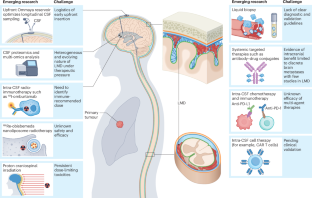Leptomeningeal metastatic disease: new frontiers and future directions
IF 81.1
1区 医学
Q1 ONCOLOGY
引用次数: 0
Abstract
Leptomeningeal metastatic disease (LMD), encompassing entities of ‘meningeal carcinomatosis’, neoplastic meningitis’ and ‘leukaemic/lymphomatous meningitis’, arises secondary to the metastatic dissemination of cancer cells from extracranial and certain intracranial malignancies into the leptomeninges and cerebrospinal fluid. The clinical burden of LMD has been increasing secondary to more sensitive diagnostics, aggressive local therapies for discrete brain metastases, and improved management of extracranial disease with targeted and immunotherapeutic agents, resulting in improved survival. However, owing to drug delivery challenges and the unique microenvironment of LMD, novel therapies against systemic disease have not yet translated into improved outcomes for these patients. Underdiagnosis and misdiagnosis are common, response assessment remains challenging, and the prognosis associated with this disease of whole neuroaxis remains extremely poor. The dearth of effective therapies is further challenged by the difficulties in studying this dynamic disease state. In this Review, a multidisciplinary group of experts describe the emerging evidence and areas of active investigation in LMD and provide directed recommendations for future research. Drawing upon paradigm-changing advances in mechanistic science, computational approaches, and trial design, the authors discuss domain-specific and cross-disciplinary strategies for optimizing the clinical and translational research landscape for LMD. Advances in diagnostics, multi-agent intrathecal therapies, cell-based therapies, immunotherapies, proton craniospinal irradiation and ongoing clinical trials offer hope for improving outcomes for patients with LMD. Leptomeningeal metastatic disease (LMD) arises secondary to the metastatic dissemination of cancer cells into the leptomeninges and cerebrospinal fluid. Novel therapies against systemic disease have not yet translated into improved outcomes for patients with LMD, in whom median survival after diagnosis remains at 2–6 months. The authors of this Review, a multidisciplinary group of experts, describe the emerging evidence and areas of active investigation in LMD and provide directed recommendations for future research.


轻脑膜转移性疾病:新领域和未来方向
脑膜转移性疾病(LMD),包括“脑膜癌病”、“肿瘤性脑膜炎”和“白血病/淋巴瘤性脑膜炎”,继发于肿瘤细胞从颅外和某些颅内恶性肿瘤转移至脑膜和脑脊液。LMD的临床负担一直在增加,这是由于更敏感的诊断,对离散性脑转移的积极局部治疗,以及使用靶向和免疫治疗药物改善颅外疾病的管理,从而提高了生存率。然而,由于LMD的药物递送挑战和独特的微环境,针对全身性疾病的新疗法尚未转化为改善这些患者的结果。诊断不足和误诊是常见的,反应评估仍然具有挑战性,与整个神经轴相关的预后仍然非常差。研究这种动态疾病状态的困难进一步挑战了有效治疗方法的缺乏。在这篇综述中,一个多学科专家小组描述了LMD的新证据和积极调查的领域,并为未来的研究提供了直接的建议。借鉴机制科学、计算方法和试验设计方面的范式改变进展,作者讨论了优化LMD临床和转化研究前景的特定领域和跨学科策略。诊断、多药鞘内治疗、细胞治疗、免疫治疗、质子颅脊髓照射和正在进行的临床试验的进展为改善LMD患者的预后提供了希望。
本文章由计算机程序翻译,如有差异,请以英文原文为准。
求助全文
约1分钟内获得全文
求助全文
来源期刊
CiteScore
99.40
自引率
0.40%
发文量
114
审稿时长
6-12 weeks
期刊介绍:
Nature Reviews publishes clinical content authored by internationally renowned clinical academics and researchers, catering to readers in the medical sciences at postgraduate levels and beyond. Although targeted at practicing doctors, researchers, and academics within specific specialties, the aim is to ensure accessibility for readers across various medical disciplines. The journal features in-depth Reviews offering authoritative and current information, contextualizing topics within the history and development of a field. Perspectives, News & Views articles, and the Research Highlights section provide topical discussions, opinions, and filtered primary research from diverse medical journals.

 求助内容:
求助内容: 应助结果提醒方式:
应助结果提醒方式:


